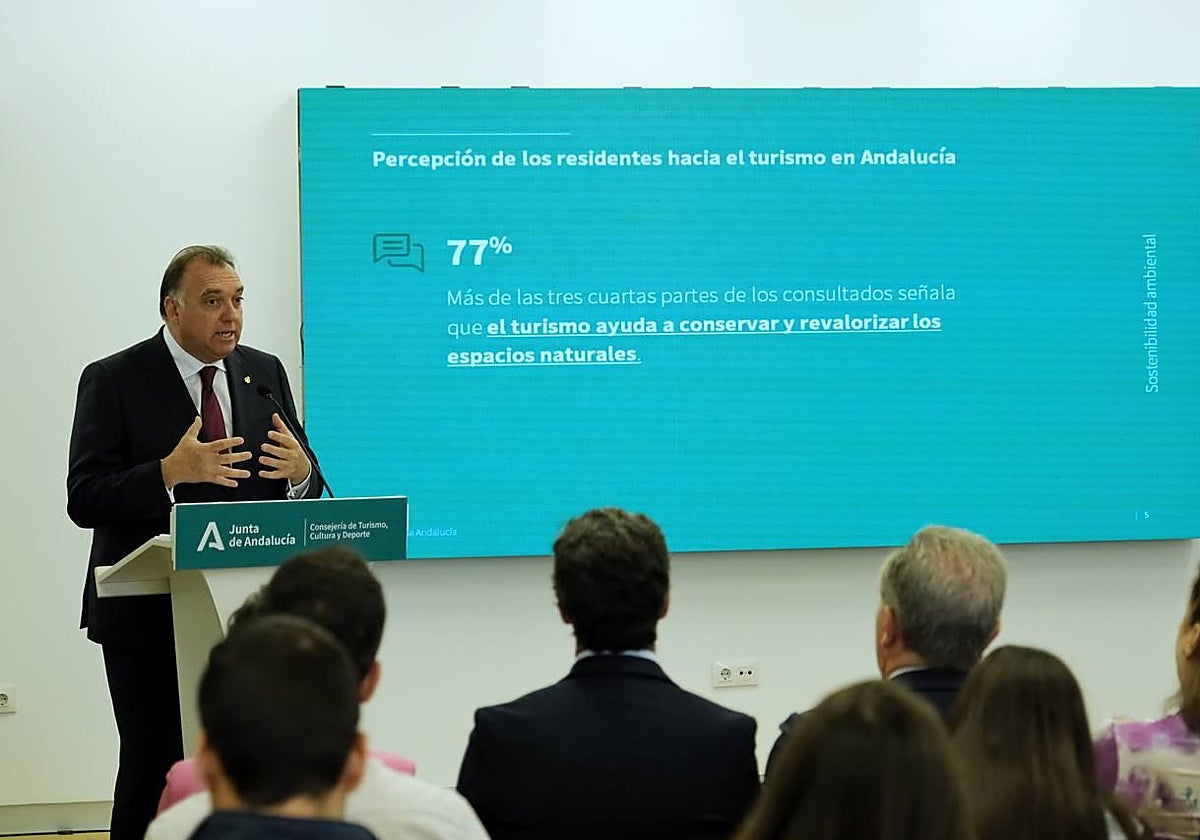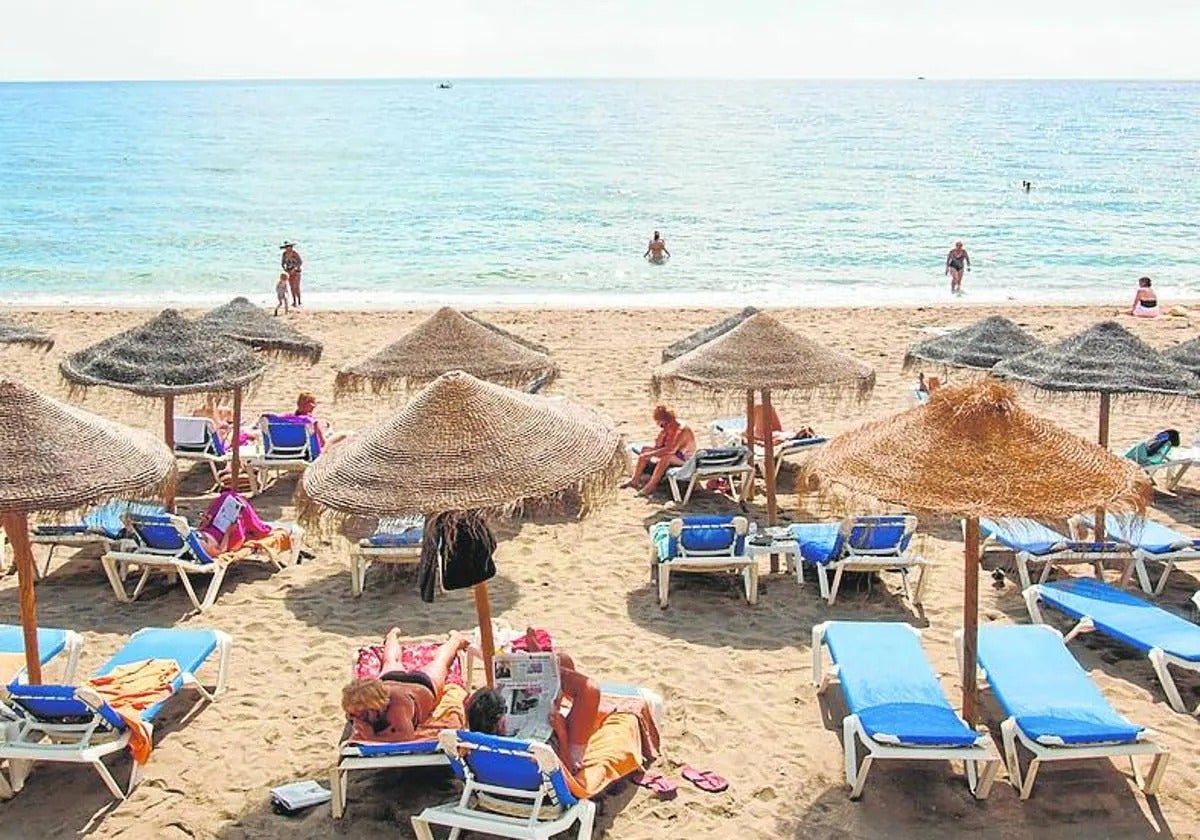Tourism-phobia has few followers in Andalucía: nine out of ten locals support the holiday sector
A Junta study has found that "the biggest problem for the well-being of residents is not in tourism as an activity, but in certain types of tourism such as stag and hen parties, 'booze tourism' and the management of tourist apartments as a type of accommodation"
Andalucía as a holiday hotspot in Spain differentiates itself from the Canary Islands as not being against tourism. A study carried out by the Junta de Andalucía regional government on the perception of residents towards this industry sector has revealed that nine out of ten residents defend this line of business.
Regional minister for tourism Arturo Bernal presented the report, pointing out that "90% of residents in Andalucía consider that tourism has a positive or very positive effect on the economy of their municipalities and on the generation of employment." An important fact in the wider, current context considering the unprecedented demonstrations in the Canary Islands against the saturation of tourists there and the unheard-of measures taken by the likes of Amsterdam city hall with a moratorium on hotels or that of Venice to charge a fee of five euros to visit the city centre.

Zoom

However, despite this overall positive sentiment, attention must be paid to the dual perception of tourism, with elements that are pleasing to residents, such as the economic benefits for their municipalities, and others that are not so welcome, and which are focused on certain types of visitors and on some very localised forms of tourism management. The study states that "the biggest problem for the well-being of residents is not in tourism as an activity, but in certain types of tourism such as stag and hen parties, 'booze tourism' and the management of tourist apartments as a type of accommodation."
Bernal explained the pioneering nature of this study in the face of "arguments that often get distorted, but this time we have gone directly to the sources, to listen first-hand to the people of Andalucía who live in the popular tourist places and to find out what they think about this activity that last year generated 26 billion euros and drew in 34.2 million people."
3,200 surveys
The minister then explained the working methods of the study that has combined the qualitative analysis of six groups of participants with a quantitative analysis totalling 3,200 surveys carried out in person across 32 towns and cities of Andalucía. Added to this was an analysis of participants' perceptions according to various variables, such as tourist saturation in the municipality where they resided, their employment links with the tourism sector, plus their gender and age.
After this, he cited data such as the fact that 91% of those surveyed considered that tourism "generates wealth and is a fundamental driving force in our economy", with a high level of consensus regarding the opinion that it also improves the local economy, due to the positive impact it has on the development of Andalucía and the generation of jobs. An assessment, he said, that is shared by 88% of those consulted. Bernal also highlighted that a large majority of residents agree that tourism helps to improve the prestige and image of their municipalities and increases their quality of life, especially where it contributes to the conservation and re-assessment of cultural heritage (81% of those consulted) and to natural heritage (77%).
"Generates some inconveniences"
The minister pulled up data on the contribution of this industry to the region, stressing that "it is an activity that has a high presence in many parts of Andalucía, which generates some inconveniences for those who work to minimise them." When covering some of the negative aspects that came out of the study Bernal mentioned the concern of residents that tourism development would raise prices - 42% of those consulted, their primary fear being that it could increase the cost of housing. He indicated the counter-argument that there was also "a broad consensus on the negative effects caused by the state-wide law on the right to housing that has considerably increased the number of empty homes."
Also, in tourist-saturated areas, those consulted noted as negative elements the congestion in public spaces, the loss of identity and changes in traditions, or the noise, the rubbish generated and the loss of natural spaces. Lastly, they flagged up the need to balance the infrastructure put in place for all.
Proposals
The conclusions of this study are also key to informing the design of a strategy to manage the unstoppable success of this sector. Thus, eight out of ten respondents agreed with promoting a better distribution of tourists throughout the year; 65% support the distribution of visitors to all districts, and 82% support investment in other sectors. "These figures coincide with the Andalusian government's line of work to reduce the seasonality of tourism and to create new tourist attractions throughout the region that generate employment, keep the population in rural areas and contribute to the development of Andalucía," said the minister.
As to the controversial application of the tourist tax, Bernal insisted that only 16% agree with applying a tax on tourists and 31% agree with limiting the supply of tourist apartments. In view of these findings, he made it clear that "both issues are not particularly relevant to the public" and that the report confirms that "tourism is a good industry for Andalucía, fundamental for its economic development and that it brings innumerable benefits."
Turning to proposals from those consulted, there is full agreement that it is time to manage the region's success in tourism in order to avoid saturation and in view of the conviction that "there is no economic future without tourism". To this end, the respondents are committed to increasing quality and not quantity. And in the face of this rejection of booze tourism and stag and hen parties, those consulted in this study proposed limiting night-time bar licences, setting up a register of people who cause problems in order to prevent them from entering Spain again, establishing supply policies that limit bookings for this type of travel, and getting tougher on anti-social behaviour, as well as limiting access to natural spaces.
But they also propose incentive measures for residents, such as free entry to museums or parking reserved just for residents, as well as not charging locals to enter blue zones. The participants repeated these thoughts: "mass tourism is causing us to lose our essence, our customs, our way of life. Tourists come looking for that, we don't have to adapt to their way of life and customs. If we lose our essence, tourists will lose the reason for coming here."

